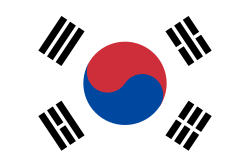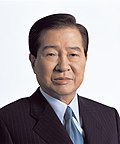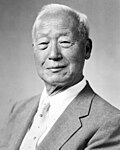Portal:South Korea
 |
대한민국 포털
The South Korea Portal


South Korea, officially the Republic of Korea (ROK), is a country in East Asia. It constitutes the southern half of the Korean Peninsula and borders North Korea along the Korean Demilitarized Zone, with the Yellow Sea to the west and the Sea of Japan to the east. Like North Korea, South Korea claims to be the sole legitimate government of the entire peninsula and adjacent islands. It has a population of about 52 million, of which half live in the Seoul Metropolitan Area, the ninth most populous metropolitan area in the world; other major cities include Busan, Daegu, and Incheon.
The Korean Peninsula was inhabited as early as the Lower Paleolithic period. Its first kingdom was noted in Chinese records in the early seventh century BC. From the mid first century BC, various polities consolidated into the rival kingdoms of Goguryeo, Baekje, and Silla, with the lattermost unifying most of the peninsula for the first time in the late seventh century AD while Balhae succeeded Goguryeo in the north. The Goryeo dynasty (918–1392) achieved lasting unification and established the basis for modern Korean identity. The subsequent Joseon dynasty (1392–1897) saw the height of cultural, economic, and scientific achievement as well as prolonged peace and isolationism from the mid-17th century. The succeeding Korean Empire (1897–1910) sought modernization and reform but was annexed in 1910 into the Empire of Japan. Japanese rule ended following Japan's surrender in World War II, after which Korea was divided into two zones: a northern zone, which was occupied by the Soviet Union, and a southern zone, which was occupied by the United States. After negotiations on reunification failed, the southern zone became the Republic of Korea in August 1948, while the northern zone became the communist Democratic People's Republic of Korea the following month.
In 1950, a North Korean invasion triggered the Korean War, one of the first major proxy conflicts of the Cold War, which saw extensive fighting involving the American-led United Nations Command and the Soviet-backed People's Volunteer Army from China. The war ended in 1953 with an armistice but no peace treaty, leading to the ongoing Korean conflict, and left three million Koreans dead and the economy in ruins. South Korea endured a series of dictatorships punctuated by coups, revolutions, and violent uprisings, but also experienced a soaring economy and one of the fastest rises in average GDP per capita, leading to its emergence as one of the Four Asian Tigers. The June Democratic Struggle of 1987 ended authoritarian rule and led to the establishment of the current Sixth Republic. (Full article...)
Selected article -
Daegu (Korean: 대구; [tɛ̝.ɡu]), formerly spelled Taegu and officially Daegu Metropolitan City (대구광역시), is a city in southeastern South Korea. It is the third-largest urban agglomeration in South Korea after Seoul and Busan; the fourth-largest metropolitan city in the nation with over 2.3 million residents; and the second-largest city after Busan in the Yeongnam region in southeastern South Korea. Daegu and the surrounding North Gyeongsang Province are often referred to as Daegu-Gyeongbuk, with a total population of over 5 million.
Daegu is located in south-eastern Korea about 80 km (50 mi) from the coast, near the Geumho River and its mainstream, Nakdong River in Gyeongsang Province. The Daegu basin is the central plain of the Yeongnam region. In ancient times, the Daegu area was part of the proto-kingdom Jinhan. Subsequently, Daegu came under the control of the Silla Kingdom, which unified the Korean Peninsula. During the Joseon period, the city was the capital of Gyeongsang Province, one of the traditional eight provinces of the country.
Daegu was an economic motor of Korea during the 1960s–1980s period. The humid subtropical climate of Daegu is ideal for producing high-quality apples, thus the nickname, "Apple City". Daegu is also known as "Textile City", as textiles used to be the main industry of the city. With the establishment of the Daegu-Gyeongbuk Free Economic Zone, Daegu currently focuses on fostering fashion and high-tech industries. (Full article...)
Selected image

South Korea is located in East Asia, on the southern half of the Korean Peninsula jutting out from the far east of the Asian land mass. The only country with a land border to South Korea is North Korea, lying to the north with 238 kilometres (148 mi) of border running along the Korean Demilitarized Zone. South Korea is mostly surrounded by water and has 2,413 kilometres (1,499 mi) of coast line along three seas; to the west is the Yellow Sea, to the south is the East China Sea, and to the east is the East Sea. Geographically, South Korea's land mass is approximately 100,032 square kilometres (38,623 sq mi). 290 square kilometres (110 sq mi) of South Korea are occupied by water. The approximate coordinates are 37° North, 127° 30 East. Notable islands include Jeju Island (Jejudo), Ulleung Island (Ulleungdo), and Liancourt Rocks (Dokdo).
More did you know -
- ...that in 1999, Song Il-gon became the first Korean filmmaker to win an award at the Cannes Film Festival?
- ...that with little prior experience, South Korean actress Kim Ok-bin was given a leading role in her first film, Voice, and was nominated for "Best New Actress" at the Blue Dragon Film Awards?
- ... that Korean writer Park Kyung-ni spent 25 years writing the 16-volume epic novel Land, which has been included in the UNESCO Collection of Representative Works?
In the news
- 20 July 2025 –
- 17 people are killed and 11 are missing in heavy rains in South Korea. (AP News)
- 18 July 2025 – 2024 South Korean martial law crisis
- The Seoul Central District Court rejects former president Yoon Suk Yeol's petition to release him due to an unreasonable request more than a week after he was re-arrested on charges related to a failed martial law attempt on December 3, 2024. (The Korea Herald)
- 17 July 2025 –
- At least four people are killed, two others are seriously injured and more than 1,000 others are evacuated after torrential rainfall submerges buildings and causes a landslide in Gyeonggi and South Chungcheong provinces, South Korea. (Reuters) (The Korea Herald)
- 9 July 2025 – 2024 South Korean martial law crisis
- The Seoul Central District Court issues an arrest warrant for former South Korean president Yoon Suk Yeol over five key charges related to his short-lived martial law declaration on December 3, 2024, placing him in custody for the first time since March due to concerns of evidence tampering. (Yonhap)
- 7 July 2025 – Cabinet of Lee Jae Myung
- Kim Min-seok is officially inaugurated as the prime minister of South Korea at the Government Complex in Sejong City, four days after he was approved by the National Assembly. (The Korea Herald)
- 6 July 2025 – 2024 South Korean martial law crisis
- Prosecutors in South Korea request that former president Yoon Suk Yeol be detained amid the ongoing investigation against him for insurrection. (Reuters)
The Air Battle of South Korea was an air campaign early in the Korean War occurring roughly from 25 June to 20 July 1950 over South Korea between the air forces of North Korea and the United Nations, including the countries of South Korea, the United States and the United Kingdom. The month-long fight for air supremacy over the country included several small engagements over airfields in Seoul and Taejon and ultimately ended in victory for the UN air force, which was able to destroy the small North Korean People's Air Force. (Full article...)
General images -
Did you know (auto-generated)

- ... that South Korean band Seventeen partnered with Apple to let fans create remixes of their song "Darl+ing" on GarageBand?
- ... that The Seoul Press was an English-language newspaper created to justify Japan's colonial rule of Korea?
- ... that Sung Min Song, who was an informatics engineer in Seoul until age 26, performed the extreme tenor role of Arnold in Rossini's Guillaume Tell as his debut at the Saarländisches Staatstheater?
- ... that Draken is the tallest, fastest, and joint-steepest roller coaster in South Korea?
- ... that Cho Myung-chul was the first North Korean defector to be elected to the South Korean National Assembly?
- ... that in the Russian Far East, there is a population of North Koreans in Kamchatka that now aligns itself with South Korea?
WikiProjects
See WikiProject Korea for collaborating on South Korea topics, and more broadly, on all things Korea-related.
Categories
Related portals
East Asia
Associated Wikimedia
The following Wikimedia Foundation sister projects provide more on this subject:
-
Commons
Free media repository -
Wikibooks
Free textbooks and manuals -
Wikidata
Free knowledge base -
Wikinews
Free-content news -
Wikiquote
Collection of quotations -
Wikisource
Free-content library -
Wikiversity
Free learning tools -
Wikivoyage
Free travel guide -
Wiktionary
Dictionary and thesaurus
Web resources
- The official website of the Republic of Korea (Korea.net)
- The Official Korea Tourism Guide Site
- Korea National Statistical Office
- Video on South Korea-US Relations from the Dean Peter Krogh Foreign Affairs Digital Archives
- "South Korea". The World Factbook (2025 ed.). Central Intelligence Agency.
- A Country Study: South Korea in the Library of Congress
- South Korea from UCB Libraries GovPubs
- Korea OECD
- South Korea profile from the BBC News
- South Korea Encyclopædia Britannica entry
- The War Memorial of Korea
- Key Development Forecasts for South Korea from International Futures
Sources

























































